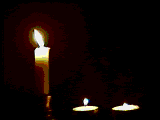

 The word Bard is used in English and other Indo-Euopean languages chiefly to denote a Celtic poet (and musician). Musicians and poets comparable to the Celtic Bard
have also been found in other cultures. Bards have greatly influenced the musical and general histories of their peoples, among the Celts they were mainly responsible for
the development of secular music.
The word Bard is used in English and other Indo-Euopean languages chiefly to denote a Celtic poet (and musician). Musicians and poets comparable to the Celtic Bard
have also been found in other cultures. Bards have greatly influenced the musical and general histories of their peoples, among the Celts they were mainly responsible for
the development of secular music.
The above is a very rough outline of bards and their history. Below, is a more detailed explanation of the evolution of the Bard in different Celtic Cultures:
Throughout the British Isles local kings, princes and chieftains maintained bards, bestowing gitfs upon them for their services. The bards played the harp, and sang elegies and eulogies on famous men, composed proverbs, and recited sagas. Monasteries also occasionally maintained bards as historians and genealogists. The high esteem in which the bard was held is evident in the early legal codes of both Ireland and Wales. The Laws of Hywel Dda (Howel the Good), distinguish two classes of bard: the bardd teulu, who was a permanent official of the king's household, and the pencerdd ('chief of song'), or head of the bardic fraternity in the district. These classes of resident and itinerant bards, also found in Ireland and Scotland, are similar to classes found amongst other Indo-European ethnic groups, e.g. in Anglo-Saxon England the classes of scop and gleeman. These classes, like the Scandinavian skald and other poet-musicians of early nations, have sometimes been termed 'bards' in English literature.
In medieval society in Ireland and Scotland, professional men of learning were organized into a caste system, under various descriptions: draio (the Gaelic equivalent of 'druid'), fili, later file (poet-seer), breitheamh ('brehon', or lawgiver) and seanchaidh (historian-antiquarian). These terms possibly denoted various offices or duties of the highest orders in the professional hierarchy.
In short, yes. The term bard has sometimes been extended to refer to epic singers of non-Celtic peoples, such as the aoidoi of the Homeric epics and the bards of Eastern and Western Central Asia. Singing long narrative poems of the great heroes of the past, these epic singers were also poets, composers, instrumentalists, and story-tellers. The many sided nature of their role goes back to a past when their function were in some ways comparable to those of the old Celtic bards.
Singers, musicians, storytellers, poets - anyone whose art is more than mere entertainment. Whose performance captures your imagination, making you forget you are being performed to, that has that touch of magic you can't quite describe. They are the true modern day bards.
If you want to be a minstrel/bard, the SCA has a great page called The Bardic Primer, for people who wish to know what being a bard entails. Although it is written specifically for the SCA bards, it is equally applicable to those outside of the SCA who are interested in learning more about becoming one. However, if you wish to be a proper druidic bard, try The Order of Bards, Ovates and Druids, which provides a college accredited course on becoming a bard.
No, just a musician with an interest in bards and medieval/celtic music. I have applied for the introduction package from the course mentioned above and found it quite interesting. I am also hoping to play a minstrel/bard in a Renaissance Faire in the near future. I will keep you posted.
The information above was mainly from the 'Music and Musicians' Encyclopedia. Other pages with information specifically on bards are: The Order of Bards, Ovates and Druids, The Gyldenholt Circle of Bards, The Rowanhold Bardic Circle, The Minstrel's Gallery, On Bards, and Bardic Circles, The Bardic Craft
BARDS | MINSTRELS | TROUBADOURS
Back to the Library.